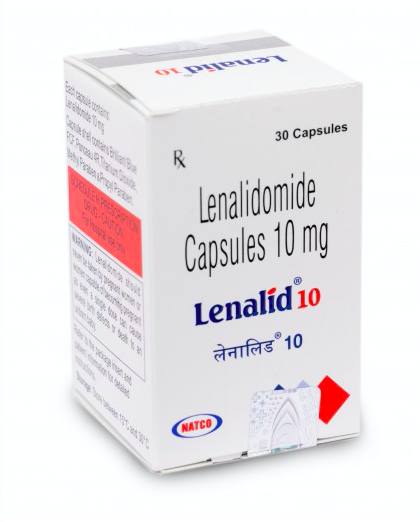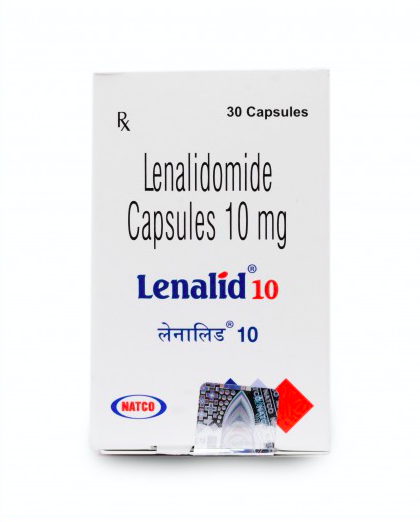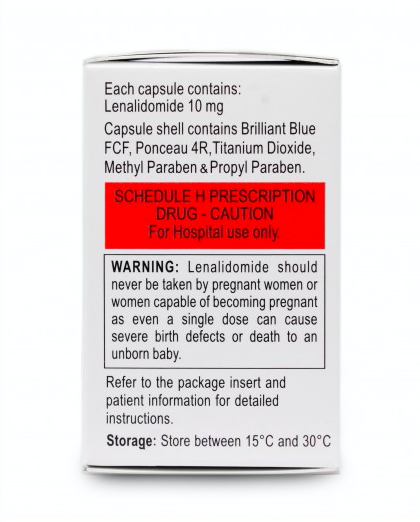 Introduction
IntroductionWhat LENALID 10MG is used for?
LENALID 10MG is used to treat in adults for:
- Multiple myeloma
- Myelodysplastic syndromes (MDS)
- Mantle cell lymphoma (MCL)
 Warning & Precautions
Warning & PrecautionsTalk to Doctor
Talk to your doctor before you take this medicine, if you:
- Are allergic (hypersensitive) to LENALID 10MG or any of the other ingredients of this medicine
- Have had blood clots in the past
- Have any signs of an infection, such as a cough or fever
- Have or ever had previous viral infection, particularly hepatitis B infection, varicella zona, HIV
- Have kidney problems
- Have had a heart attack
- Have MDS, you may be more likely to get a condition called acute myeloid leukemia (AML)
Pregnancy & Breast Feeding
- LENALID 10MG should not be taken in pregnant, as it is expected to be harmful to an unborn baby
- You must not become pregnant while taking LENALID 10MG. Therefore, you must use effective methods of contraception if you are a woman of childbearing potential
- You must not breast-feed when taking LENALID 10MG, as it is not known if LENALID 10MG passes into human milk
Children & Adolescents
- LENALID 10MG is not recommended for use in children and adolescents under 18 years
Driving & Using Machines
- Do not drive or operate machines if you feel dizzy, tired, sleepy, have vertigo or blurred vision after taking LENALID 10MG
 Interactions
InteractionsTell your doctor if you are taking,
- Medicines used to prevent pregnancy such as oral contraceptives, as they may stop working
- Digoxin used for heart problems
- Warfarin used to thin the blood
 How to Use
How to Use- Always take this medicine exactly as your doctor has told you
- Swallow the medicine whole, preferably with water
- This medicine can be taken either with or without food
- You may be monitored with regular blood tests before and during the treatment as lenalidomide may cause a fall in the white blood cells and platelets, required to fight infection, Hemoglobin and blood clotting.
If you take more LENALID 10MG
- If you have taken more LENALID 10MG than you should, talk to your doctor or local hospital accident and emergency department
If you forget to take LENALID 10MG
- If you forget to take LENALID 10MG at your regular time and less than 12 hours have passed - take your dose immediately. more than 12 hours have passed - do not take the medicine. Take your next dose at the usual time the next day
If you Stop to take LENALID 10MG
- Do not stop taking LENALID 10MG until the doctor has told you to do so
 Side Effects
Side EffectsLike all medicines, this medicine can cause side effects, although not everybody gets them
Serious
- Reduce the number of white blood cells, blood cells which help the blood to clot (platelets) which may lead to bleeding disorders such as nosebleeds and bruising
- Blood clots in the veins (thrombosis).
- Fever, chills, sore throat, cough, mouth ulcers or any other symptoms of infection including within the bloodstream (sepsis)
- Bleeding or bruising in the absence of injury
- Chest pain or leg pain
- Shortness of breath
Common
- A fall in the number of red blood cells which may cause anemia leading to tiredness and weakness constipation, diarrhoea, nausea, redness of skin, rashes, vomiting, muscle cramps, muscle aches, bone pain, joint pain, tiredness, generalized swelling including swelling of your arms and legs
- Decreased appetite, low levels of potassium in the blood, leg pain, chest pain or shortness of breath
- Infection of the lungs, upper respiratory tract, shortness of breath
- Blurred vision, clouding of your eye (cataract)
- Kidney problems
- Changes to a protein in the blood that can cause swelling of the arteries (vasculitis)
- Increases in your blood sugar level (diabetes)
- Increase in pain, tumor size, redness around the tumor
- Increased blood pressure or a fall in blood pressure, slow, fast or irregular heart beat
- Difficulty getting an erection
- Stroke, fainting, muscle weakness, joint swelling
- Changes to blood thyroid hormone, low levels of calcium, phosphate or magnesium in the blood
- Depression, deafness, abnormal liver test results, impaired balance, difficulty moving, ringing in the ears (tinnitus)
- An excess of iron in the body
- Thirst, confusion, toothache, weight loss
Uncommon
- Bleeding within the skull
- Circulatory problems
- Loss of vision
- Loss of sex drive (libido)
- Passing large amount of urine with bone pain and weakness, which may be symptoms of a kidney disorder (fanconi syndrome)
- Stomach pain, bloating marked by inflammation in the large intestine (called colitis or caecitis)
- Renal tubular necrosis
Rare
- Tumour lysis syndrome - high potassium, phosphorus, uric acid, and low calcium consequently leading to changes in kidney function, heartbeat, seizures, and sometimes death
 More Information
More InformationStorage
- Protect from excess heat and light
- Keep this medicine out of reach of children
- Store at room temperature (15-25°C)
- Do not use this medicine after the expiry date
 FAQs
FAQsQ. Can I take Lenalid empty stomach?
Lenalid may be taken with or without food. Always take it exactly as prescribed by your doctor. Do not crush, cut or chew the capsules. Swallow it whole with water. You should take Lenalid at about the same time on the scheduled days.
Q. Can Lenalid be given to patients who are on dialysis?
Yes, Lenalid is given to dialysis patients after the dialysis is done. However, the doctor may adjust the dose if needed in patients undergoing.
Q. What are the side effects of Lenalid?
Lenalid may cause side effects which include diarrhea, constipation, stomach pain, loss of appetite, weight loss, weakness, dizziness, change in ability to taste, and pain or burning of the tongue, mouth, or throat. The medicine may also cause decreased sense of touch, burning or tingling in the hands or feet, difficulty falling asleep or staying asleep, depression, and joint, muscle, bone, or back pain. You may also experience sweating, dry skin, abnormal hair growth in women, uncontrollable shaking of a part of the body, decrease in sexual desire or ability or painful, frequent, or urgent urination. Tell your doctor if any of these symptoms are severe or do not go away.
Q. What are the serious side effects of Lenalid?
The serious side effects of Lenalid include difficult breathing or swallowing, hoarseness or swelling of the face, throat, tongue, lips, eyes, arms, hands, feet, ankles, or lower legs. Some of the serious side effects may also include seizures, rash, skin pain, fast, slow, pounding, or irregular heartbeat or blistering, peeling, or shedding skin. It may also cause swollen glands in the neck, muscle cramps, pain in the upper right part of the stomach, yellowing of the skin or eyes, dark colored urine, tiredness, or bloody, cloudy, or painful urination and increased or decreased urination. Call your doctor immediately if you get any of these side effects.
Q. Can Lenalid cause cancer?
People with multiple myeloma (a form of cancer that begins in plasma cells, a type of white blood cell) who receive melphalan (chemotherapy) and a blood stem cell transplant with the addition of Lenalid have a higher risk of developing new cancers. These types of cancers may include certain blood cancers (acute myelogenous leukemia or AML) and a type of lymphoma called Hodgkin lymphoma. Talk to your doctor about your risk of developing new cancers if you are taking Lenalid.
Q. Do I need to get any blood tests done while on Lenalid?
Your doctor will ask you to have a blood test before treatment and every week for the first 8 weeks of treatment. You may need to continue taking the blood tests at least every month after treatment with Lenalid ends. Frequent blood tests are important as Lenalid may decrease the blood cells that help fight infection (white blood cells) and help the blood to clot (platelets).
Q. Do I need to use birth control methods while using Lenalid?
Women who can become pregnant must use two acceptable forms of birth control for 4 weeks before they begin taking Lenalid. Continue using contraceptives during your treatment, including the times when your doctor tells you to temporarily stop taking Lenalid, and for 4 weeks after your final dose. In men, Lenalid may pass into the semen while they are on treatment. Therefore, men must always use a latex condom every time they have sexual contact, even if they have had a vasectomy (surgery that prevents a man from causing a pregnancy). Use the contraceptive while you are taking Lenalid, during any breaks in your treatment, and for 4 weeks after your final dose.
 Disclaimer:
Disclaimer:The contents of this website are for informational purposes only and not intended to be a substitute for professional medical advice, diagnosis, or treatment. Please seek the advice of a physician or other qualified health provider with any questions you may have regarding a medical condition. Do not disregard professional medical advice or delay in seeking it because of something you have read on this website.
PRODUCT DETAILS
ALTERNATE BRANDS View All
The contents of this website are for informational purposes only and not intended to be a substitute for professional medical advice, diagnosis, or treatment. Please seek the advice of a physician or other qualified health provider with any questions you may have regarding a medical condition. Do not disregard professional medical advice or delay in seeking it because of something you have read on this website.










